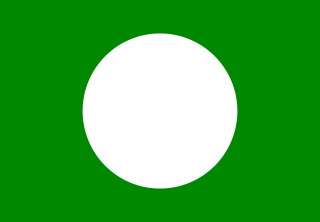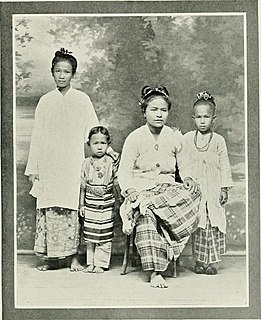
Politics of Malaysia takes place in the framework of a federal representative democratic constitutional monarchy, in which the Yang di-Pertuan Agong is head of state and the Prime Minister of Malaysia is the head of government. Executive power is exercised by the federal government and the 13 state governments. Federal legislative power is vested in the federal parliament and the 13 state assemblies. The judiciary is independent of the executive and the legislature, though the executive maintains a certain level of influence in the appointment of judges to the courts.

The Chams or Cham people, are an ethnic group of Austronesian origin in Southeast Asia. Their contemporary population is concentrated between the Kampong Cham Province in Cambodia and Phan Rang–Tháp Chàm, Phan Thiết, Ho Chi Minh City and An Giang Province in Southern Vietnam. Including the diaspora, their total is about 400,000. An additional 4,000 Chams live in Bangkok, Thailand, who had migrated during Rama I's reign. Recent immigrants are mainly students and workers, who preferably seek work and education in the southern Islamic Pattani, Narathiwat, Yala and Songkhla provinces. A large Cham diaspora also established in Malaysia following the turbulence during the Pol Pot regime, where they were quickly assimilated with the local Malay population. Cham people represent the core of the Muslim communities in both Cambodia and Vietnam.

Satun is one of the southern provinces (changwat) of Thailand. Neighboring provinces are Trang, Phatthalung, and Songkhla. To the south it borders Perlis of Malaysia.

The Malaysian Islamic Party is an Islamist political party in Malaysia. PAS's electoral base is in Malaysia's rural and conservative north. The party has governed the east coast state of Kelantan twice and has also, in the past, formed governments in Terengganu, Perak (2008-2009), Kedah (2008–2013), Penang (2008-2015) and Selangor (2008-2018). The party currently holds 18 of the 222 seats in the federal House of Representatives and has elected parliamentarians or state assembly members in eight of the country's 13 states.

Patani is a historical region in the northern part of the Malay peninsula. It includes the southern Thai provinces of Pattani, Yala (Jala), Narathiwat (Menara), and parts of Songkhla (Singgora).

Songkhla, also known as Singgora or Singora, is a city in Songkhla Province of southern Thailand, near the border with Malaysia. As of 2006 it had a population of 75,048. Songkhla lies 968 km (601 mi) south of Bangkok.

Malaysia is a multiconfessional country whose most professed religion is Islam. As of 2013, there were approximately 19.5 million Muslim adherents, or 61.3% of the population.

Islam is a minority faith in Thailand, with statistics suggesting 4.9 percent of the population are Muslim. Figures as high as 5 percent of Thailand's population have also been mentioned. Most Thai Muslims belong to the branch of Sunni Islam, although Thailand has a diverse population that includes immigrants from around the world.
Tan Sri Dr. Syed Muhammad al Naquib bin Ali al-Attas is a Malaysian Muslim philosopher. He is one of the few contemporary scholars who is thoroughly rooted in the traditional Islamic sciences and who is equally competent in theology, philosophy, metaphysics, history, and literature. He is the pioneer in proposing the idea of Islamisation of knowledge. Al-Attas' philosophy and methodology of education have one goal: Islamisation of the mind, body and soul and its effects on the personal and collective life on Muslims as well as others, including the spiritual and physical non-human environment. He is the author of twenty-seven works on various aspects of Islamic thought and civilisation, particularly on Sufism, cosmology, metaphysics, philosophy and Malay language and literature.

The South Thailand insurgency is an ongoing conflict centered in southern Thailand. It originated in 1948 as an ethnic and religious separatist insurgency in the historical Malay Patani Region, made up of the three southernmost provinces of Thailand and parts of a fourth, but has become more complex and increasingly violent since 2001.
The Islamic Liberation Front of Patani, until 1986 known as the National Liberation Front of Patani is a militant Islamic separatist movement based in northern Malaysia and with a history of operations in the South Thailand insurgency.

The Patani United Liberation Organisation is a separatist insurgent group in Thailand, calling for an independent Patani. The PULO, along with others, is currently fighting for the independence of Thailand's predominantly Malay Muslim south.

Bersatu, also referred to as the Patani Malays People's Consultative Council was an umbrella group of separatist organisations of the predominantly Muslim and Malay provinces of Southern Thailand ("Patani").
Anti-Malay sentiment refers to hostility or hatred that is directed toward Malays or the state of Malaysia.

The Jabidah massacre was a disputed massacre of Moro army recruits by members of the Armed Forces of the Philippines (AFP) on March 18, 1968, which is acknowledged as a major flashpoint that ignited the Moro insurgency in the Philippines.

Malaysia–Thailand relations refers to bilateral foreign relations between the two countries, Malaysia and Thailand. Thailand has an embassy in Kuala Lumpur, and consulate-general offices in George Town and Kota Bharu. Malaysia maintains an embassy in Bangkok.
The Pattani Islamic Mujahideen Movement is an Islamic insurgent movement that has carried out violent actions as part of the protracted insurgency in Southern Thailand.

Kelantanese Malays are a sub-ethnic group of Malays native to the state of Kelantan, Malaysia as well as in northern Terengganu. The Kelantanese Malays are closely related to Thai Malays and Terengganuan Malays in neighbouring Terengganu, these two Malay sub-ethnic groups shared historical, cultural and linguistic as well as kinship ties with the Kelantanese Malays. Kelantanese Malays forms 94% of Kelantan's population, which makes them the largest ethnic group in Kelantan and around 150,000 in Besut, Terengganu.
Haji Sulong Abdul Kadir Al-Fatani, also known as Haji Sulong Tomina or Hajji Sulong, was a notable figure in understanding the Muslim insurgency of southern Thailand. Labeled as a reformist and a separatist he sought for greater recognition of the Jawi community in Patani.
















